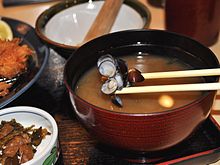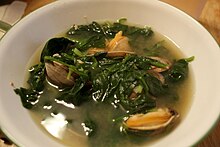Clam soup


Clam soup is a soup prepared using clams as a primary ingredient. Clam soup can be prepared as a thin, broth- or cream/milk-based soup and as a thicker, chowder-style soup. In Japan, hot miso soup prepared with clams is believed by some to be a cure for the hangover.
Overview
[edit]Clam soup is prepared using clams as a main ingredient. Additional ingredients can include carrot, celery, onion and other vegetables, vegetable broth or stock or other types of broths and stocks (such as fish stock)[1] seasonings and spices, salt and pepper. Fresh or canned clams can be used to prepare the dish.[2] Clam chowder is a well-known clam soup, but not all clam soups are chowders or have the thick consistency that chowders typically possess.
In Japan, hot miso soup with clams is a traditional cure for the hangover.[3] Clams possess high levels of ornithine, an amino acid that some Japanese people believe serves to reduce levels of stress, and "helps improve liver function—including detoxifying harmful substances like alcohol."[3] A canned clam soup product named "Power of 70" claims to cure hangovers.[3]
Varieties
[edit]Clam chowder
[edit]
Clam chowder is a clam soup prepared as a chowder, typically using a cream base.[4] Several varieties of clam chowder exist. Manhattan clam chowder is a tomato-based soup prepared with vegetables and clams, but lacks cream or milk.[4][5][6]
Jaecheop-guk
[edit]Jaecheop-guk is a clear Korean soup made with small freshwater clams called jaecheop (재첩, Corbicula leana). It is a local specialty of the Gyeongsang Province where jaecheop are harvested, such as the lower reaches of Nakdong River, and river basins around Gimhae, Myeongji, Eumgung, and Hadan counties[7] as well as places near the Suyeong River in Busan and the Seomjin River.[8]
Gallery
[edit]- Clam soups
-
A simple clam soup
-
Korean clam soup with spinach
-
Fresh clam soup
See also
[edit]References
[edit]- ^ Farmer, F.M. (1896). Original 1896 Boston Cooking-School Cook Book. Dover Publications. p. xxii. ISBN 978-0-486-29697-5.
- ^ Goldthwaite, M.; Cognard-Black, J.; Nestle, M. (2014). Books That Cook: The Making of a Literary Meal. NYU Press. p. 31. ISBN 978-1-4798-3021-3.
- ^ a b c Bellomo, Rheanna O'Neil (October 20, 2015). "Hot Clam Soup Might Be The Hangover Cure We've Been Searching For". Delish. Retrieved March 19, 2017.
- ^ a b Warshaw, H.S. (2015). Eat Out, Eat Well: The Guide to Eating Healthy in Any Restaurant. American Diabetes Association. p. 303. ISBN 978-1-58040-618-5.
- ^ Voltz, Jeanne (October 29, 1972). "What is a Chowder?". Journal News. Retrieved March 19, 2017.
- ^ Correa, Cynthia (January 31, 2016). "A Brief History of Clam Chowder". Eater. Archived from the original on August 30, 2018. Retrieved March 19, 2017.
- ^ "Jaecheopguk (edile cockle soup)". triptokorea.com. Archived from the original on 2011-07-17. Retrieved 2017-03-19.
- ^ "Jaecheopguk (재첩국)" (in Korean). Doosan Encyber. Retrieved 2008-05-25.[permanent dead link]
Further reading
[edit]- Tanis, David (December 2, 2016). "The more broth, the better with this Thai-style clam soup". The Straits Times. Retrieved March 19, 2017.




